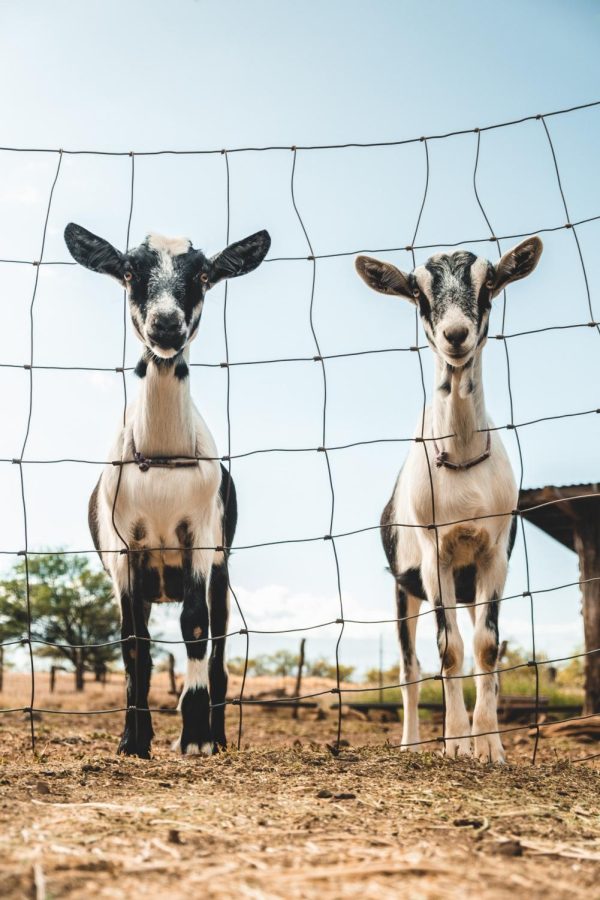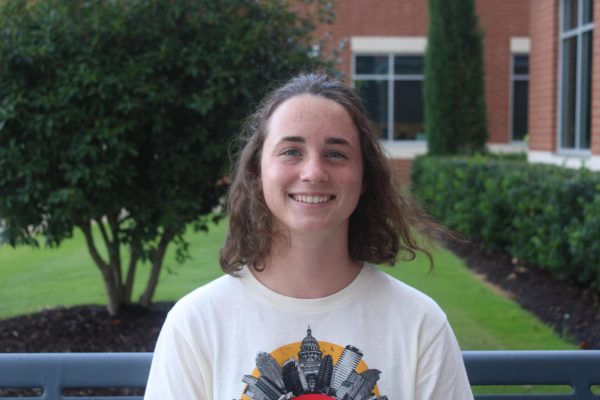Turning to the Goats
Using goats as an eco-friendly alternative to abolish invasive species
Goats have become a common solution to eliminating invasive plant species.
November 30, 2022
Goats might be the best solution to kudzu problems. As strange as this sounds, it is not a joke. The City of Spartanburg has recently begun renting goats to clear the
overgrown kudzu and ivy on walking paths in Duncan Park. Goats are known for eating anything they can get their mouths on, so a creative new industry has sprung up as a lawn care business. Rental goats are now available to mow down paths, fields or yards over- run by kudzu, ivy or other invasive vegetation.
Rather than using chemicals, goats are an environmentally-friendly way to get rid of invasive plant species in and around Spartanburg. Able to eat up to several pounds of brush a day, goats will even eat poison ivy. Many of the goats that are available for rent are a special breed, which has an especially large ap- petite. These unique goats, which have previously gained social media fame, are myotonic or fainting goats.
Helen Colbath (9) has witnessed the appetite of these goats firsthand. Having an overgrown backyard that needed a good trimming, the Colbath family decided to rent a herd of goats to get the job done. Not only did the goats do their job, but they also looked adorable while doing it.
“My family rented goats for my back- yard, and it was great. They were friendly and super cute. I think that goats are a great way of clearing lands because they are eco-friendly and it was a great way to get rid of unwanted plants but keep the plants that we wanted,” Colbath said.
Goats are common and plentiful around Spartanburg. Since they can get rid of invasive species naturally, there is no need for pesticides that give people cancer, weed killers that can pollute the soil and water, or introducing an unfamiliar species that may end up backfiring on the local ecosystem. The invasive species
that goats help get rid of in South Carolina include, but are not limited to, poison ivy, woody shrub, poison sumac, kudzu, English ivy, wisteria, Japanese stilt grass and poison oak.
Ellen Fields (12), a member of the SHS Envirothon team, knows the environmental advantages of using goats to clear lands of invasive species.
“I think that using goats to clear land is a great option. Goats have a lesser environmental impact than traditional methods of plant removals such as herbicides,” Fields said.
While the plants can grow back because the goats only find the leaves appetizing, over time the vines die off due to lack of energy production because of their missing leaves. The plant must use root reserves to grow more leaves, which slowly kills the plant. The process happens much more quickly when the goats are continuously grazing on said plants.
Duncan Park has hired rental goats to get rid of the invasive species that have been terrorizing those trails since the 1960s. An electric fence was put up to keep the goats in and away from harm, but still allowing visitors to come by and watch the goats happily munching away. In just three months, the goats cleared the ivy from all the trees in a nine-acre area. Once the goats’ job is done, the city is going to hire a forester to remove the invasive tree species, allowing the native trees to regain control of the ecosystem. When all of the invasive species are
cleared out, Duncan Park is going to create new biking and walking trails.
Liam McEnroe (12) is a cross country runner for Spartanburg High School and has run the trails in Duncan Park many times. He has seen the trails of the park become overrun and is happy that Spartanburg is doing something to fix it.
“I think that there was once a time when Duncan Park was one of Spartanburg’s best parks, but over the years the over vegetation has definitely decreased the quality of the trails. In reference to that though the goats they have had there have made a significant impact on the invasive species and helped the trails to become what they once were again,” McEnroe said.





